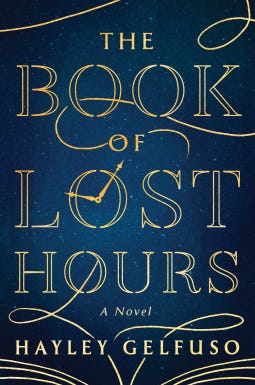Book Review: The Book of Lost Hours by Hayley Gelfuso
Expected Release Date: August 26, 2025
Thanks to NetGalley for an electronic ARC of The Book of Lost Hours in exchange for an honest review.
If history is written by the victors, does that hold true for memories and time? That question is central to Hayley Gelfuso’s story in The Book of Lost Hours. The world is rife with conflict throughout time, and the storytelling is largely left to the victorious. But what about memories? What about the people who made incredible contributions to the world but were forgotten by time? Were they forgotten or were they purposefully erased to shape the narrative of the powerful.
A young Jewish girl, Lisavet Levy, is saved by her father from the Nazis in the nick of time on Kristallnacht, and she’s flung into a space with collected memories from time immemorial. In the “time-space” she learns about history by walking through memories, and also learns that history, and time itself, is being manipulated by global superpowers, namely the US and Russia, by a small army of their “timekeepers” as they grapple for power. Lisavet takes it upon herself to salvage bits of memories left behind by timekeepers who enter the time-space to burn books, and in doing so she sparks a rebellion.
At face value, this is a basic time travel novel, but the time travel is simplified to temporal displacement along the timelines of the main characters. It explores geopolitical power, the preservation of history, and the ethical dilemma of manipulating historical narratives for political reasons or for self interest. If nothing else, this is an extremely timely allegory for what’s going on in the world today.
Although it starts during World War II with Nazi timekeepers as the antagonist, it transitions into a 1950s spy drama (spilling into the 1960s), as a sub-division of the CIA battles with their Russian counterparts to control the narrative during the Cold War. Lisavet is a survivor and manages to persevere through abandonment, sexism, entrapment, and manipulation at the hands of the CIA agents. It also explores Lisavet’s statelessness as a Jewish girl abandoned as the Nazis swept through Europe and having her own identity swept away in its wake, which is what forces her to work with the CIA to stay alive.
While this is a truly interesting premise for a book, it falls short in several ways. The writing is extremely simple and very predictable, feels more at home in the Young Adult category. There are some questionable word choices and sentences that lack agency, so it is unclear who is doing what. The only Black character is a pawn shop owner in a bad part of town that is chronically harassed by government agents, and who is ultimately shot for protecting the memories of Black people. There is a lot of blatant sexism and constant bombardment with gender roles (for example, a male character’s enjoyment of poetry is referred to as feminine). The American timekeepers, with one exception, are all very one dimensional in a McCarthyist way. The love story is predictable, which leads to a predictable ending tied up all too neatly.
Rating: 🌕🌕🌕🌑🌑 (3/5)
Who this book is for:
Folks who enjoy stories about time travel and its repercussions
Anyone interested in history, as the book is loosely framed as historical fiction
Anyone concerned about how history is manipulated by the powerful and how that impacts the rest of us
The multiverse curious
Folks who prefer fast paced reads
Anyone who enjoys characters that are morally gray or blatantly unlikeable that drive the story
Anyone captivated by time as a concept created and manipulated by humanity
Avid fans of YA Fiction
Anyone interested in how shifting political landscapes and international conflict affects immigration and statehood
Who this book is not for:
Folks who are seasoned readers of time travel and multiverse fiction
Anyone interested in a truly diverse cast of characters that are multidimensional
Readers who appreciate nuance and complex writing (not just a mildly complex plot)
Anyone tired of racial and gender stereotypes (regardless of the time period)



